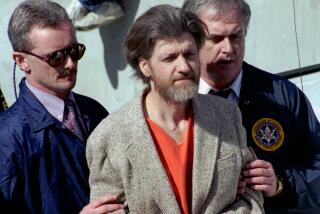Kaczynski Hindered Defense, Lawyer Says
- Share via
SACRAMENTO — An attorney representing Unabomber suspect Theodore Kaczynski said Friday that the defense team was caught off guard by the severity of its client’s mental problems and by how he turned into a roadblock to his own defense.
“Counsel failed to appreciate the depth of the illness,” defense attorney Gary Sowards told U.S. District Judge Garland E. Burrell at a hearing on whether Kaczynski should be forced to submit to a prosecution-supervised mental examination.
Kaczynski recently defied Burrell and refused to undergo such an examination. His attorneys contend that his refusal was prompted by a paranoid schizophrenic condition and dread of psychiatrists.
Now Burrell must decide whether to penalize Kaczynski and limit the defense team’s use of its own mental health witnesses.
Unable to come up with a compromise during the 90-minute hearing, Burrell threw the thorny issue back into the lap of attorneys. He asked them to try to reach a solution next week.
The hearing nonetheless revealed a few more details about the mental problems allegedly suffered by Kaczynski, 55, who is accused of being the anti-technology Unabomber and is on trial in four bomb attacks, including two fatal strikes in Sacramento.
Sowards said snippets of Kaczynski’s writings show that he believes “people are out to get him, and society is bearing down to get him.”
The defense attorney described Kaczynski as having a “paranoid delusional system that dictates” his life. Without elaborating, Sowards alluded to Kaczynski’s fear of satellites, surveillance and mind control.
And Sowards said his client had frustrated his attorneys, adding that Kaczynski’s illness makes him afraid of even his own side’s mental health experts.
UCLA law professor Peter Arenella, in a telephone interview Friday, said Kaczynski’s actions are not unusual for a disturbed defendant with a political agenda.
“He’s a roadblock to his defense by his own refusal to allow government psychiatrists to examine him and on substance because of his own damaging admissions in those diaries” found in his Montana cabin, Arenella said.
In making his decision, Burrell must perform a delicate balancing act, to avoid handing either side the courtroom advantage.
More to Read
Sign up for Essential California
The most important California stories and recommendations in your inbox every morning.
You may occasionally receive promotional content from the Los Angeles Times.










